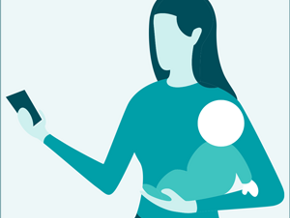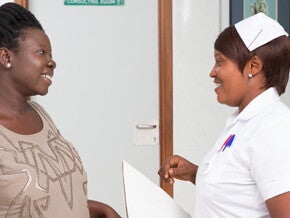
What to eat and avoid during pregnancy
You want to eat a healthy, well-balanced diet. You know it has benefits for both you and the baby growing in your belly. So how can you pick out which foods to eat during pregnancy?
Folic acid
Role/Benefits: Essential for normal early development of your baby's spinal cord and brain. In addition to the folic acid you get in a varied diet, healthcare professionals recommend that all women who could become pregnant and those who are pregnant or breastfeeding take a multivitamin containing 0.4-1.0 mg of folic acid every day.1,2.
Food Sources: Green vegetables, peas, beans and lentils, orange juice, organ meats (liver, kidney), nuts and seeds, and folic acid fortified bread, cereals or pasta.
Iron
Roles/Benefits: Critical to your body’s ability to supply oxygen throughout both yours and your baby’s body, and essential for development of the placenta and baby's red blood cells. Adequate iron can prevent iron-deficiency (this condition can be as serious as it sounds, and can lead to symptoms like fatigue, paleness and lack of energy).
Your greatest iron needs are from the fourth month on. When choosing non-meat sources of iron, serve them along-side vitamin C-rich foods to enhance iron absorption.
Food Sources: Meats, organ meats (liver*, kidney), seafood, poultry, fish, iron-fortified cereals, iron-fortified pasta, nuts and seeds, dried fruits, eggs, beans, dark green leafy vegetables.
Calcium
Roles/Benefits: Essential for building baby’s strong bones and protects your own bone mass.
Your greatest need for calcium is during the third trimester. Dairy products are especially rich in calcium and there are many other foods that also contain high levels of calcium such as spinach, and many varieties of beans.
Food Sources: Milk, cheese, yoghurt, sardines or salmon with bones, calcium-fortified beverages. (Fortified orange juice, fortified soy)
Vitamin D
Role/Benefits: Important for maintaining and building strong bones for both you and baby. It also enhances absorption of calcium.
The need for vitamin D does not change during pregnancy. Very few foods contain vitamin D naturally, so you may want to talk to your doctor about taking a vitamin D supplement to ensure you are getting enough.
Food Sources: Food Sources: Vitamin D-fortified milk, yoghurt and margarine, fatty fish (e.g. salmon, sardines, mackerel, etc.), fish oils.
Fatty fish and DHA
Role/Benefits: Critical for the healthy development of your baby's brain, eyes and nerves.
DHA is most important during the last trimester, a time when your baby’s brain starts to develop more rapidly. Try to consume at least 150 grams of cooked fish each week as part of your healthy diet. Many foods are now fortified with DHA such as some types of milk and margarines.
Food Sources: Fatty fish (salmon, mackerel, sardines, etc.), nuts, seeds and vegetable oils (canola, corn, soybean, sunflower, peanut, etc.) .
Protein
Role/Benefits: Building blocks of each and every cell of your baby.
During the second trimester of pregnancy, your protein needs increase by 40–50% (about 71 grams) daily. Yes, that’s a lot, so pump up your salad with meat or alternatives and swap jam for nut butters to help meet your body’s protein needs.
Food Sources: Meat, fish, seafood, poultry, eggs, legumes (peas, beans, lentils, etc.), nuts, groundnut paste, milk products.
Foods to avoid during pregnancy
So, now that you know which pregnancy foods you should build into your meal plan, you just need to make sure you’re aware of which foods to avoid (or handle with extra care) during pregnancy—some can even carry food-borne illnesses. Foods to avoid during pregnancy include certain types of fish, unpasteurized dairy products and raw or undercooked eggs, to name a few.
The list of foods you should avoid includes:
- Refrigerated smoked seafood.
- Non-dried deli meats such as bologna, roast beef and turkey breast. (Got a craving? If you choose to eat these meats heat them until they are steaming hot—also avoid eating hot dogs out of the package, make sure to cook them fully).
- Raw or lightly cooked meat.
- Unpasteurized cheeses and milk, soft and semi-soft cheeses such as Brie or Camembert.
- Blue-veined cheeses, such as, Stilton, or Danish Blue (unless they have been pasteurized, always read the label at the grocery store).
- Uncooked liver, liver-based foods.*
- Cod liver oil.
- Unpasteurized cider and eggnog (Always read the label at the grocery store).
- Soft-boiled eggs or eggs used raw in foods such as homemade mayonnaise, and desserts such as mousses.
- Raw and uncooked sushi and shellfish.
- Avoid eating shark, marlin, swordfish, orange roughy, escolar and tuna (light tuna is ok) as these have been shown to contain relatively high levels of methyl-mercury, which might affect your baby’s nervous system. (Plus, these foods may contain bacteria, such as listeria and salmonella, or they may have high levels of vitamin A).
Food safety
Follow these common sense tips when handling food3:
- Always wash your hands before handling food or eating.
- Wash fruit and salad well, even pre-packed salads, and always put chilled or frozen foods in the fridge or freezer soon after you’ve bought them.
- Ensure that you cook all meat thoroughly—do not eat raw or undercooked meat.
- Use safe food handling practices when preparing meat and poultry.
- Do not eat any reheated food unless it is piping hot (only reheat food once, never save it for a third meal).
- Always check the best before date on store-bought foods.
- When purchasing liver and liver-based products such as pâté and meat spreads, choose varieties that are shelf stable and do not require refrigeration prior to opening.*
- Always fully cook any fresh liver or organ meats.*
Substances that can harm you and your baby
The potential dangers of certain substances are quite well known. But understanding why these things can be dangerous, to both you and your unborn baby, makes it easier to avoid them.
Smoking
Nicotine, tar and carbon monoxide are chemical substances associated with smoking. If you smoke before or after your baby is born, you risk your health and your baby's health. The sooner you quit, the better it will be for your baby.
It’s a good idea to encourage your partner and other family members to quit too, because second-hand smoke can put you and your baby at risk.
Caffeine
This one’s probably a tough one. Coffee, tea, cola and some other carbonated soft drinks, energy drinks, chocolate and some cold and headache medications contain caffeine. Too much caffeine could contribute to some complications in pregnancy including low birth weight4.
Alcohol
No amount of alcohol can be safely recommended during pregnancy because health experts simply do not know what level is safe. Due to the detrimental effects alcohol can have on your growing baby, experts also recommend that you avoid alcohol during pregnancy and minimize your intake while breastfeeding.
Drugs
Many types of drugs can affect your baby. Some can cause severe birth defects or other problems for your baby. Be sure your doctor or healthcare provider knows about any drugs you were taking before your pregnancy. Also, you should not take any prescription or non-prescription drugs without the advice of a healthcare professional.
Natural Health Products (NHPs) & other herbal products
It’s natural. The bottle says herbal. It must be safe, right? That’s the perception, yes, helped by the fact that these products are made from plants or other natural substances—but it’s very important to read the label. Many products may not be safe for pregnant women. Consult your doctor before taking any natural health products during pregnancy.
*Liver is very high in vitamin A. Too much vitamin A may cause birth defects, especially during the first trimester. If you choose liver products, have no more than 75g of liver per week
Reference:
- Wilson RD et al. Pre-conception Folic Acid and Multivitamin Supplementation for the Primary and Secondary Prevention of Neural Tube Defects and Other Folic Acid-Sensitive Congenital Anomalies. SOGC Clinical Practice Guideline, No. 324. J Obstet Gynaecol Can. 2015;29(12):1003-1013.
- Government of Canada. Folic acid, iron and pregnancy. 2016. Accessed June 12, 2017.
- Government of Canada. Safe Food Handling for Pregnant Women. 2014. Accessed: May 31, 2017.
- Public Health Agency of Canada. Healthy Pregnancy: Caffeine and Pregnancy. 2014. Accessed June 2, 2017.












